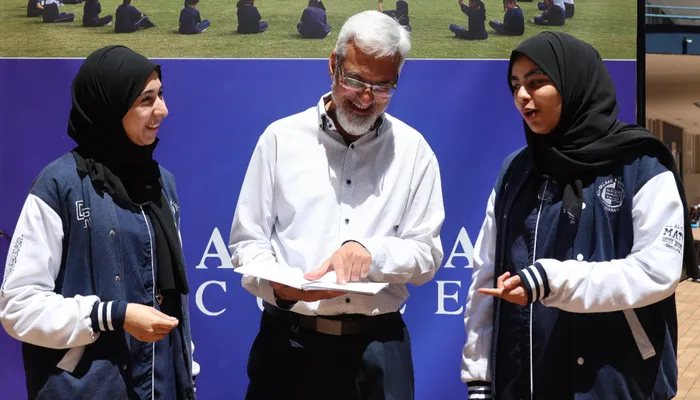Grade 12 pupils speak out on exams, results publication
Privacy vs tradition

Zaffar Ahmed, the principal of Al-Falaah College, speaks to matric pupils Khairunnisa Essa and Deeyana Randeree following maths paper 2 on Monday.
Image: Tumi Pakkies/Independent Newspapers
AS GRADE 12 pupils complete their final exams, a legal battle unfolds in the Pretoria High Court over the tradition of publishing matric results in newspapers.
Pupils from Al-Falaah College shared their experiences with challenging papers as they tackle the final exams, and voiced concerns about the privacy implications of publicly displaying their academic achievements.
- Khairunnisa Essa, 18, from uMhlanga, had mixed reactions about the exams and said obtaining her results was personal and private.
“So far my papers have been good. However, both maths paper one and two was difficult. I felt the level of the questions was unfair, but I managed through both papers. I just pray that I did well. I studied well for the finals and revised many past year papers. My favourite subjects are life science and accounting.”
While she was hopeful about her results, Khairunnisa was firm in her stance against its public release.
“I would not like for my results to be published in the newspapers. It is an invasion of my privacy. This is my moment and personal achievement. I would like to share when I am ready, and not for others to look for in the paper for my results.”
She hopes to study medicine at the University of KwaZulu-Natal next year. If successful she will become the first doctor in her family.
- Deeyana Randeree, 18, of Musgrave, shared a similar view.
“Maths paper one was very challenging but it was not impossible. Maths paper two was slightly better and manageable. The questions in these papers were easier to understand and answer. My favourite subject is physical science because it combines science and maths.”
Deeyana said she believed publishing the results served little purpose.
“Publishing our results in the paper is unnecessary. The Grade 12 results are not the most important thing that you should be defined by. School is a small part of life. We should worry about our next steps. I feel it holds no value to have the results in the papers. It reduces the pupils to only their results and nothing more.”
She plans to study pharmacy at the University of KwaZulu-Natal.
Meanwhile, the Department of Basic Education (DBE) has defended its practice of publishing the National Senior Certificate (NSC) results, saying its method did not contravene the Protection of Personal Information Act (Popia).
The North Gauteng High Court in Pretoria has reserved judgment in the matter between the Information Regulator and the DBE, following a two-day hearing held on October 27 to 28, 2025. The challenge arises after the Information Regulator sought a full review of the DBE’s established practice, contending that publishing results in their current format breached pupils’ privacy rights. This follows an earlier urgent application brought in January 2025, which the court dismissed for lack of urgency.
In a statement, the department said its publication method, which displayed examination numbers without names or other personal identifiers, did not violate the Popia.
“The information published cannot be directly or indirectly linked to any individual without intimate or prior knowledge. An examination number, on its own, does not constitute ‘personal information’ as defined under the act.”
The department highlighted that publishing the matric results had been a matter of public interest for decades, providing reassurance to pupils, families and the broader public regarding the integrity of the national examination system. It emphasised that it remained committed to balancing the right to privacy with the principles of openness, accountability, and public confidence in education.
At the conclusion of proceedings, Advocate Pansy Tlakula, chairperson of the Information Regulator, noted the importance of ventilating the matter in open court to clarify pupils’ privacy rights under the Popia, said the department.
“The court will now deliberate on the submissions made by both parties before delivering its judgment.”
- Additional reporting Hope Ntanzi.
Related Topics: